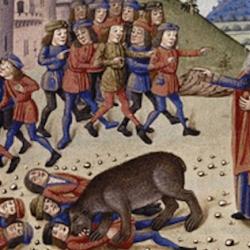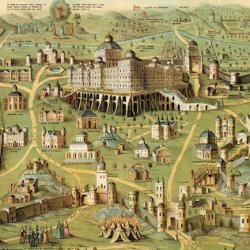1) Jezebel sends a messenger, a mal?ak , which in Hebrew is the same word as angel, anticipating the angel of Yahweh later in the chapter. The chapter shows us contrasting angels, an angel of death and an angel that raises the ?dead?Ewith a touch and gives food.
2) Jezebel is seeking a sort of justice, life for life and soul for soul. She has been making Elijah and the prophets of Yahweh the scapegoats for some time, but the scapegoating becomes explicit here, with the ?life as their lives?Esubstitution.
3) The verb for ?leave?Ein verse 3 is nuach, which in other aspects means to ?settle?Eor ?rest,?Eand is the source of the name Noah. The word is used several times early in Kings to describe the rest that Israel enjoys under Solomon. The ?lad?Eleft at Beersheba is reminiscent of Ishmael (Genesis 21), as is the appearance of the angel to Elijah later in the wilderness, the angel that provides food in the desert, as the angel did for Ishmael and Hagar. There are clearly other allusions to the Ishmael story as well. Elijah sits under a ?broom tree,?Ea species mentioned elsewhere only in Psalm 120:4 and Job 30:4. In Psalm 120, the broom tree is associated with the tents of Kedar, and Kedar is one of the sons of Ishmael (Genesis 25:13). Ishmael is placed under a bush in the desert, and Elijah sits under a tree in the desert. An angel appears to Hagar, as an angel appears to Elijah, offering food and refreshment. Ishmael is near death and is rescued from death, and Elijah is desiring to die, but is raised up.
How this works biblical-theologically is not clear: Perhaps Elijah is the outcast son, forced to flee from the house of Abraham because of the hostility of Jezebel. Perhaps there is an Isaac-Ishmael split going on within Israel here, similar to what Paul describes at the end of Galatians 4.
4) Through the encounter with the angel, Elijah is being renewed in his prophetic calling. This is brought out by verbal and other echoes with Isaiah 6. Like Isaiah, Elijah is ?touched?E(Is 6:7) by an angel. The key link, however, is the use of ?live coal,?Ewhich is used only in these two passages. The angel doesn?t touch Elijah?s lips, as the seraphim does with Isaiah, but Elijah does eat the thing baked on coals. Further, the Hebrew is literally ?Behold! By his head baked of live coals, and a jar of water.?EThe word ?cake?Edoes not appear; though Elijah actually ate some kind of cake or bread baked over the coals, the Hebrew hints that he is eating live coals. He ?eats?Ethe live coals, and they burn in him so that he is restored to prophetic office.
5) Why does the angel appear twice, touch Elijah twice, rouse him twice, order him to eat and drink twice? The whole scene is not only a prophetic re-commissioning, but a death and resurrection scene. Elijah sleeps on the ground and is roused to new life and food, as Daniel is a few times after receiving visions (cf. Dan 8:15ff). But Elijah goes through a double resurrection, and only after his second resurrection does he go off to Sinai.
6) This episode in the life of Elijah has certain parallels to the episode of the golden calf in Exodus 32. This paradigm was already running in the background in 1 Kings 18, as I noted in some posts last week. Here, it is evident not only in the fact that Yahweh appears in all His glory to Elijah, as He did to Moses in the aftermath of the golden calf incident, but in the use of the verb paraq , ?tear away,?Eused in 19:11 and also three times in Exodus 32 (vv. 2, 3, 24: all refer to ?tearing away?Ethe jewelry for the calf). The echoes of the golden calf story set us up for the irony of Elijah?s plea before Yahweh. He does not ask Yahweh to have mercy, but accuses Israel of covenant-breaking and implies that they need to be judged even more strongly than they have been.
7) Elijah stays in a cave, as do the Yahweh-prophets rescued by Obadiah. Behind both is Lot, who resided in a cave following the destruction of Sodom with fire from heaven. The connection with Lot is strengthened by the verb for ?cover?Ein 19:13, used in only a handful of places in the OT (1 Sam 21:10; 2 Sam 19:5; Is 25:7), but also the root of the name ?Lot.?EThere is also the verb malat , ?get to safety?Eor ?escape,?Eused in 1 Kings 19:17 and in Genesis 19:17. Elijah has already seen fire fall from heaven on the altar (1 Kings 18), and he?s getting ready to play the prophet by accusing Israel, calling for Yahweh to consider her as a Sodom, where not even 10 righteous remain. He is thus not only a reverse Moses, but a reverse Abraham. Of course, Yahweh informs him that there are many more than 10 righteous remaining in Israel.
8) ?Forsook?Ein 19:20 is the same verb as in Elijah?s accusation against Israel: Israel has forsaken the covenant, and now Elisha is forsaking his plowing. Since the plowing is associated with the number 12 (either the number of yokes or the number of acres), Elisha?s forsaking of the plowing is a forsaking of Israel. Elisha leaves Israel to follow Elijah, who will be the instrument for forming a new Israel within Israel.











